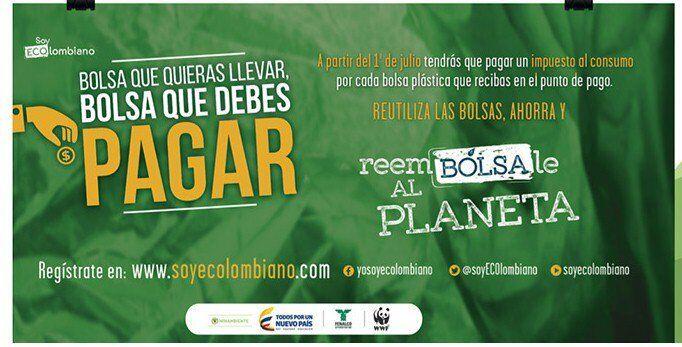Colombia took a new step in favor of the oceans on July 1, when a tax on plastic bags came into force that seeks to contribute to the national goal of reducing the production of this article by 60%.
Commercial establishments that deliver bags to their customers must charge a fee of 20 Colombian pesos (approximately 1 cent) for each bag. This rate will be increased by 10 pesos (half a dollar) each year, so that by 2020 it will reach 50 pesos (2 cents) per bag.
“This tax points to an environmental sustainability that will depend on the conscience of each of the Colombians,” said the Minister of Environment and Sustainable Development of Colombia, Luis Gilberto Murillo.
Colombia, a member of the Mares Limpios campaign of the UN Environment , already reduced the consumption of plastic bags by 27% in 2017 after launching other measures that discourage their use and promote biodegradable bags.
The bags smaller than 30 × 30 centimeters were out of circulation since December 31, 2016 and the new ones must have enough capacity to support more weight, as well as messages alluding to recycling and care of the planet.
With these policies, framed in the local campaign Reembolsale al Planeta , the Government and private companies seek to gradually reduce the use of bags in the following years, until reaching a reduction of 60% with respect to 2016 levels.
“Colombia advances in the regulation of plastic bags. We have seen in the last year a change in the habit of consumption that undoubtedly has a very positive impact when it comes to reducing the environmental effects of waste such as plastic, “said Minister Murillo.
These commitments are aligned with the Mares Limpios campaign of the UN Environment, which aims to end by 2022 with the production of microplastics and single-use plastics.
In addition to Colombia, the governments of Brazil, Costa Rica, Panama, the Dominican Republic and the Mexican city of Tijuana support the campaign and are committed to combating marine pollution.
According to official and WWF estimates, a Colombian uses 6 weekly bags, 24 bags a month, 288 bags a year and 22,176 bags averaging 77 years of life. An unsustainable rhythm that causes negative impacts on the health of the oceans.
At the Conference on the Oceans , which was held from June 5 to 9 in New York, Colombia ratified the commitment to increase the extension of marine protected areas from the current 8.59% to at least 13% of the Colombian marine territory, by above the global goal of 10% before 2020.
Colombia is one of the countries with the greatest marine diversity worldwide, with a coastal line of 2,900 kilometers and a territorial sea that reaches almost one million square kilometers. In its waters there are 2,600 marine species, 155 hard corals and 6 of the 7 existing turtle species.
Marine waste, mostly made up of plastic waste, is one of the serious threats that loom over the oceans. Twenty times more plastic is produced today than in the 1960s.
source: http://bit.ly/2lH7lFv











